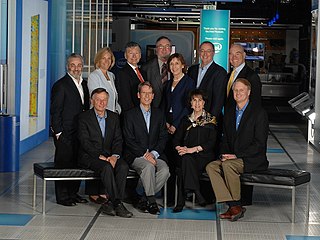
A film crew is a group of people, hired by a production company, for the purpose of producing a film or motion picture. The crew is distinguished from the cast, as the cast are understood to be the actors who appear in front of the camera or provide voices for characters in the film. The crew is also separate from the producers, as the producers are the ones who own a portion of either the film studio or the film's intellectual property rights. A film crew is divided into different departments, each of which specializes in a specific aspect of the production. Film crew positions have evolved over the years, spurred by technological change, but many traditional jobs date from the early 20th century and are common across jurisdictions and filmmaking cultures.
A general manager (GM) is an executive who has overall responsibility for managing both the revenue and cost elements of a company's income statement, known as profit & loss (P&L) responsibility. A general manager usually oversees most or all of the firm's marketing and sales functions as well as the day-to-day operations of the business. Frequently, the general manager is responsible for effective planning, delegating, coordinating, staffing, organizing, and decision making to attain desirable profit making results for an organization.
A production assistant, also known as a PA, is a member of the film crew and is a job title used in filmmaking and television for a person responsible for various aspects of a production. The job of a PA can vary greatly depending on the budget and specific requirements of a production as well as whether the production is unionized.
A technical director (TD) is usually a senior technical person within e.g. a software company, engineering firm, film studio, theatre company or television studio. This person usually has the highest level of skill within a specific technical field.
Congressional staff are employees of the United States Congress or individual members of Congress. The position first developed in the late 19th century, and it expanded significantly during the 20th century. Staffers may work with individual members of Congress, or they may be associated with committees or other organizations that support Congress.

"Get out the vote" or "getting out the vote" (GOTV) describes efforts aimed at increasing the voter turnout in elections. In countries that do not have or enforce compulsory voting, voter turnout can be low, sometimes even below a third of the eligible voter pool. GOTV efforts typically attempt to register voters, then get them to vote, by absentee ballot, early voting or election day voting. GOTV is generally not required for elections when there are effective compulsory voting systems in place, other than perhaps to register first time voters.

A campaign manager, campaign chairman, or campaign director is a paid or volunteer individual whose role is to coordinate a political campaign's operations such as fundraising, advertising, polling, getting out the vote, and other activities supporting the effort, directly.

A military staff or general staff is a group of officers, enlisted and civilian staff who serve the commander of a division or other large military unit in their command and control role through planning, analysis, and information gathering, as well as by relaying, coordinating, and supervising the execution of their plans and orders, especially in case of multiple simultaneous and rapidly changing complex operations. They are organised into functional groups such as administration, logistics, operations, intelligence, training, etc. They provide multi-directional flow of information between a commanding officer, subordinate military units and other stakeholders. A centralised general staff results in tighter top-down control but requires larger staff at headquarters (HQ) and reduces accuracy of orientation of field operations, whereas a decentralised general staff results in enhanced situational focus, personal initiative, speed of localised action, OODA loop, and improved accuracy of orientation.
A residence hall director is college or university employee generally responsible for the management and daily operations of campus residence halls. While the term residence hall director is the common title used for this position in the United States, they are also known at different schools as area coordinators, area directors, hall coordinators, community directors, hall directors, resident or residence directors, resident deans, residence hall coordinators, or residence life coordinators. While different titles are used by different colleges and universities, the positions generally have similar job requirements, dependent upon the size of the institution and scope of the position's overarching department.
Television crew positions are derived from those of film crew, but with several differences.

Location scouting is a vital process in the pre-production stage of filmmaking and commercial photography. Once scriptwriters, producers or directors have decided what general kind of scenery they require for the various parts of their work shot outside the studio, the search for a suitable place or "location" outside the studio begins. Location scouts also look for generally spectacular or interesting locations beforehand, to have a database of locations in case of requests.
In the cinema of the United States, a unit production manager (UPM) is the Directors Guild of America–approved title for the top below-the-line staff position, responsible for the administration of a feature film or television production. Non-DGA productions might call it the production manager or production supervisor. They work closely with the line producer. Sometimes the line producer is the UPM. A senior producer may assign a UPM more than one production at a time.

Victory 2006 was a joint Get out the vote (GOTV) project between the California Republican Party and Californians for Schwarzenegger, with the intent of re-electing Governor Arnold Schwarzenegger and electing the entire Republican slate of candidates during the California gubernatorial election, 2006.
A hotel manager, hotelier, or lodging manager is a person who manages the operation of a hotel, motel, resort, or other lodging-related establishment. Management of a hotel operation includes, but is not limited to management of hotel staff, business management, upkeep and sanitary standards of hotel facilities, guest satisfaction and customer service, marketing management, sales management, revenue management, financial accounting, purchasing, and other functions. The title "hotel manager" or "hotelier" often refers to the hotel's general manager who serves as a hotel's head executive, though their duties and responsibilities vary depending on the hotel's size, purpose, and expectations from ownership. The hotel's general manager is often supported by subordinate department managers that are responsible for individual departments and key functions of the hotel operations.

The New South Wales State Emergency Service, an agency of the Government of New South Wales, is an emergency and rescue service dedicated to assisting the community in times of natural and man-made disasters. The NSW SES is made up almost entirely of volunteer members, numbering over 10,214 as of July 2021. Members are easily identified by their distinctive orange overalls.

The 1988 Jesse Jackson presidential campaign was Jesse Jackson's second campaign for President of the United States. This time, his successes in the past made him a more credible candidate and he was both better financed and better organized. Although most people did not seem to believe he had a serious chance at winning, Jackson once again exceeded expectations as he more than doubled his previous results, prompting R. W. Apple, Jr. of The New York Times to call 1988 "the Year of Jackson".

91.7 WCUC FM is a fully operational, FCC-licensed, non-commercial educational, student-run radio station under the Department of Communication that is operated with the intention of being a student learning lab for Clarion University of Pennsylvania.
Debbie Willhite is an American Democratic political consultant and activist who has worked on six presidential campaigns, served as Policy Director for the Speaker of the House in Connecticut, and served as the National Coordinated Campaign Director for both the 1992 and 1996 Presidential campaigns of Bill Clinton. In addition, she has worked for every Democratic National Convention from 1980 until 2008.

The Boy Scouts of America is an organization run by volunteers, however the day-to-day administration is performed by a staff of professional Scouters. The organization has professional staffing at every level—district, council, regional and national. The Chief Scout Executive is the top professional Scouter.

The term director is a title given to the senior management staff of businesses and other large organizations.












